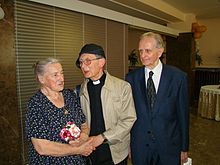Wanda Półtawska

Wanda Wiktoria Półtawska b. Wojtasik (born October 2, 1921 in Lublin ) is a Polish psychiatrist and concentration camp survivor.
Life
Born in 1921, Półtawska attended school in her home country until the German armed forces invaded in September 1939. After the occupation of Poland , she had to drop out of school. She became a member of a scout group that organized prohibited activities against the Germans. As a result, she was arrested by the Gestapo in 1941 and held in the Lublin Castle prison for six months .
Wanda Półtawska was then transferred to the Ravensbrück concentration camp , where she had to do heavy labor . At the same time, medical experiments were carried out on her and a few other women . In March 1943 she demonstrated with some women against further operations and was also briefly successful. After a while, however, the women were ordered to operate again. After they refused to go to the hospital, they were locked in the bunker and forcibly operated on. The following camp doctors worked in the Ravensbrück concentration camp: Herta Oberheuser , Rolf Rosenthal , Karl Gebhardt and Fritz Ernst Fischer . All were sentenced after the war ended.
In early 1945 the news reached the women that they should all be shot, but several women, including Półtawska, were able to go into hiding. Together with her best friend Krysia, Półtawska managed to smuggle himself into a prisoner transport to Mecklenburg with wrong prisoner numbers . In Mecklenburg in the Neustadt-Glewe subcamp they were also subjected to very bad treatment. On May 7, 1945, the concentration camp was liberated and Półtawska returned to Poland with many other women .

Półtawska has been married to the Krakow philosopher Andrzej Pòłtawski since 1947 and has four daughters. From 1951 she studied medicine and psychology at the Jagiellonian University in Kraków, specializing in psychiatry and graduating in 1964 with a doctorate in psychiatry. She described the experiences in the camps in her book And I'm Afraid of My Dreams , which appeared in 1961. In 2006 Wanda Półtawska was honored with the Eugen Bolz Prize . On June 9, 2008, the Catholic University of Lublin awarded her an honorary doctorate. She is active in Catholic organizations in Poland and as a pastoral doctor.
For 50 years, Półtawska had intensive correspondence with Karol Wojtyła , who referred to her as his sister - before and after his election as Pope. This correspondence was taken into account as evidence in the beatification process of the late Pope. After Wanda Półtawska fell ill with colon cancer in 1962, Karol Wojtyła, at the time Auxiliary Bishop of Kraków, approached Father Pio , whom he had met in 1947, through a personal messenger in a letter dated November 17, 1962 , and asked him for special advocacy Półtawska. She was suddenly healed on November 21, 1962, before the operation. A medical explanation for this spontaneous healing has not been found. When Pope John Paul II died on April 2, 2005, Wanda Półtawska was one of the few close confidants on his deathbed.
Awards and honors
- Order of the White Eagle (2016)
Works
-
I boję się snów
- German edition: Wanda Półtawska: And I fear my dreams , 1961, ISBN 3-87442-044-2 .
- Samo życie
- Z prądem i pod prąd
- Jestem odpowiedzialny za swój kwiat
Web links
- Literature by and about Wanda Półtawska in the catalog of the German National Library
Footnotes
- ↑ a b Postanowienie nr rej. 188/2016 Prezydenta Rzeczypospolitej Polskiej z dnia 28 kwietnia 2016 r. o nadaniu orderów. Retrieved December 15, 2019 .
- ↑ June 21 to July 20, 2006 ( Memento from August 12, 2011 in the Internet Archive )
- ↑ http://www.sanpadrepio.com/poltawska.htm
| personal data | |
|---|---|
| SURNAME | Półtawska, Wanda |
| ALTERNATIVE NAMES | Wojtasik, Wanda |
| BRIEF DESCRIPTION | Polish psychiatrist and concentration camp survivor |
| DATE OF BIRTH | October 2, 1921 |
| PLACE OF BIRTH | Lublin |
